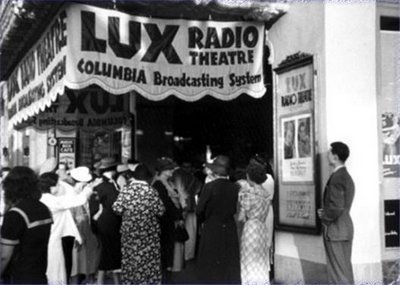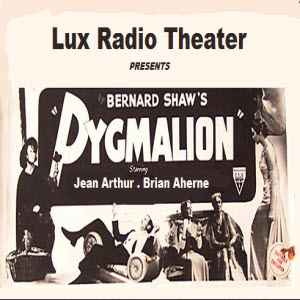
I plowed through Scott Eyman’s massive Empire of Dream: The Epic Life of Cecil B. DeMille (Simon & Schuster 2010) not because I’m a fan of color-saturated epic biblical photoplays—that Technicolor overkill leaves me cold—or even because of DeMille’s appearance in Sunset Boulevard. (Buster Keaton’s cameo is so much cooler.)
No, I’m just a fan of Lux Radio Theatre, an atypically underproduced project to which DeMille’s name was attached. Underproduced because these were audio-only restagings of popular Broadway plays and Hollywood movies. The Lux recreations often featured the same stars as their New York or California originals, yet can be even more interesting when they don’t.
The show ran on three different radio networks (primarily CBS) for 20 years, and DeMille hosted it for nine. You can hear it broadcast on a number of different internet-based Old Time Radio channels, including the fine one hosted by Antioch http://radio.macinmind.com/ and can download episodes from archive.org, http://www.archive.org/details/Lux17
iTunes, audible.com and elsewhere.
I think historians often underestimate how important a widely disseminated public image can be for a biographical subject whose talents ostensibly lay behind the scenes. The fact that Hitchcock had his own TV series, that John Huston was an actor, and that Cecil B. DeMille had Lux Radio Theater unquestionably had lots to do with them being the best-known and most-written-about directors of their respective times.
Scott Eyman, then, is remiss is doing so little reporting on DeMille’s Lux period. He does give over about seven of Empire of Dream’s 580 pages to the radio program, but nearly all of that concerns a political battle DeMille waged when the American Federation of Radio Artists proposed assessing a dollar fee from all its members to fight a state measure which would open the radio industry to non-union workers. It’s a fascinating tale in itself, one which finds the DeMille admirably sticking to his personal principles, refusing to pay, then ultimately sacrificing his cushy radio gig as a result.
But that story is well chronicled in DeMille’s own memoirs. I really want to know more about Lux Radio Theatre itself—how it was cast, how much time it took to produce. It’s clear that the hands-on DeMille didn’t just show up to read the intro scripts; his wind-up banter with the stars following the dramas seems both loose and authoritative. I remain curious about how seriously he took this decade-long gig, and how much a hand he had in it. Lux Radio Theatre is as crucial an archive of theater in its time as those golden age TV productions which ended up in the Broadway Theatre Archive box set, or the PBS series American Playhouse were in theirs.


One Response to Lax on Lux